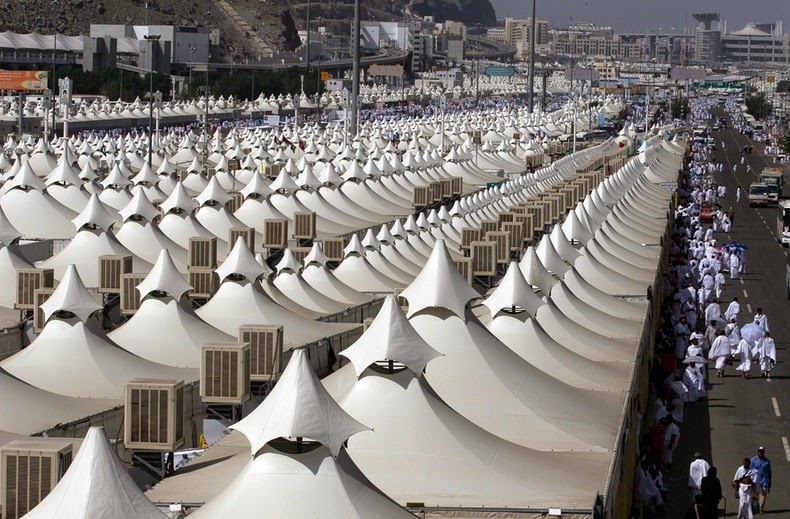“This is mind-blowing. Nothing prepares you for the time when reality sets in…you are now on the ultimate journey of life.”
That’s how former VOC sports presenter Irafaan Abrahams described his emotional first few hours at Mina’s tent city, where hujjjaj are spending the Day of Tarwiyah, the first day of hajj.

More than 1.7 million people from around the world have gathered in the sacred city of Makkah for the start of the annual Haj, a pilgrimage required of all Muslims once in a lifetime. At the start of Haj today, pilgrims began circling the cube-shaped Kaaba in Mecca and carrying out rites believed to trace the footsteps of the prophets Ibrahim and Ismail Abraham and Ishmael. The journey of the five-day-long pilgrimage begins for many when they depart from their countries dressed in “ihram”.

[Photo: Rasools Travels]
“We were made aware of how special hujjaj are as the guests of Allah. We were also reminded of their goals and the importance of guarding the tongue. You only get one Fardh hajj,” says Abrahams, who has undertaken the hajj with his wife Shamiela Abrahams.
The hujjaj were split into two groups, those travelling by bus to Mina and those who prefer the ‘walking hajj’. Hujjaj who performed the walking hajj left Azizia at 5.30am this morning for two kilometre walk, which took about two hours due to the sheer volume of people. The resolute sounds of “Labaik Allahumma Labaik” reverberated from the swarms of white robed pilgrims, said South African media personality Ashraf Garda.
“Putting on the ihram, very very quickly gets you into that haj mode. That’s when you realise, this is IT.”

Garda was impressed with the easy flow of movement into Mina and the assistance and service of Saudi civil officials.
“We left at 7am Saudi time and by 8.10am we had arrived. In the past, the same distance would’ve taken several hours because the bus route was shared with pedestrians and other vehicles. This is a dedicated bus route which makes a massive difference,” he explained.

“In Mina, there’s very little to do on the first day of hajj except salah and reflection ahead of Arafat tomorrow. This is critical as this was when Adam (as) and Gawa (as) reunited after spending 40 years in the wilderness. This is the pinnacle of hajj.”
The hajj is a realization that all are equal in their status as pilgrims. The principle of equality is visible and large-scale.
“When we landed in Madina, we stayed in luxury, right on the doorstep of the Mataaf of the Haram. We then moved to Makkah and had more 5-star treatment. But now in Aziza, living communally with four in a room, there are so many tests, such as getting to know your roommates, being separated from your spouse. You have to have sabr. And you are subconsciously being prepared for the day of Arafah. Ultimately, hajj is an individual experience,” said Abrahams.

The masses of hujjaj are now preparing for the climax of hajj tomorrow. Hujjaj are spending their time in ibaadat and reciting various athkaar, to elevate themselves spiritually. Five obligatory prayers will be completed in Mina before hujjaj move to Arafat after Fajr. Hujjaj who are walking will be departing Mina at about 2am.
Spiritual leader Shaykh Ebrahim Gabriels said the Day of Arafat is a reminder of death.
“This is the greatest journey for a Muslim as we were instructed by The Greatest, Allah swt.”
“Right now, I’m thinking about the day of Qiyama when we will be taken to stand in front of Allah swt. People are making Labaik, preparing themselves to meet Allah swt.”
Meanwhile, Saudi Arabia has deployed 100,000 security personnel to keep order, prevent political protests, and ensure the safety of the pilgrims. Stampedes, fires, demonstrations and violence have, over the years, led to thousands of deaths. The latest disaster was in 2015 when more than 2,000 were crushed to death.
Some 51,000 civilian employees provide essential services. A fleet of ambulances has been deployed, 30,000 health workers are on duty, and 5,000 hospital beds have been made ready. VOC






 WhatsApp us
WhatsApp us 

